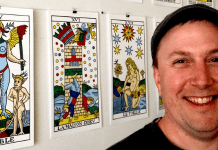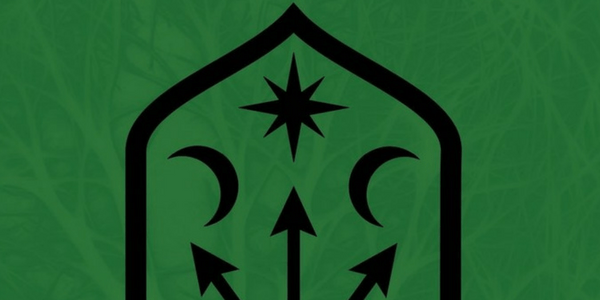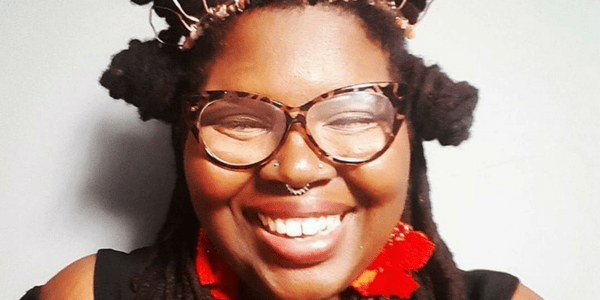An interview with Fenwick Kaidevis Rysen, chatting about altered states of consciousness, enlightenment, and his theories on integral magick.
Fenwick Kaidevis Rysen is the creator and maintainer of the website the Chaos Matrix (now a historical archive of version 6.0), and is working on his first book, tentatively titled Integral Magick.
The interview took place the evening of April 18th, 2006.
Psyche: Could you describe your path?
Fenwick Kaidevis Rysen: I started out, up until age 17, as a very strict scientific rationalist who left open the possibility of parapsychological and psychic phenomenon. After I woke up out of that, I spent a long time studying magick, first elementalism and then chaos magick; from there, Discordianism.
P: What sparked the change?
FRK: Ah, that was a specific event. I was in Sacramento on August 9th, 1994, and shortly after noon I walked into a small new-agey gift shop in Old Town called … Damnit, I’m blanking on the name. Anyhow, in the shop I found a book about runes that appealed to my interest in Viking history, and a pewter pendant that called to me for some unknown reason.
P: What was the pendant?
FRK: The pendant was a pentagram with an ankh on the bottom; the book was more about divination than anything else. The book opened my mind to the possibility that maybe the universe was more flexible than I’d given it credit for before; the pendant ended up being how I got into conversations that furthered that awareness. But I can definitely point to that day as the day I woke up into magickal awareness. The months after definitely followed Robert Anton Wilson’s descriptions of Chapel Perilous.
P: That’s one one of the great things about pentagrams – they make for great conversation starters.
FRK: That’s about the only reason I ever wear one, anymore.
P: Was there anything specific you can recall that triggered the awakening to the possibility of more than you learned through traditional science?
FRK: I already had a strong interest in parapsychology — that was what I originally considered for a Baccalaureate — so I can’t think of a specific trigger. Something about the book (and I really think it could have been any book; my mind was ripe for it) got me to ask: If so many people believe in magick, and yet I still believe in parapsychology, then why don’t I give it the benefit of the doubt? And that was a slippery slope indeed.
P: What was your first magickal experience?
FRK: Sometime that September I took a sword I owned and trekked deep into a section of a local state park where I’d never been before. I found a field that called out as the “right” place and conducted a ritual there. It’s almost embarrassing to say it, but it was a love spell. One to “attract more love into my life” rather than something specific, though.
P: How’d it work out for you?
FRK: I’m not sure how to answer that, really! It worked, that’s for certain. But I think a big part of that was in the psychology of my own mind.
It got me to think about love much more, and to contemplate it from all angles rather than from just inside my own head. My first three girlfriends all hiked up there with me; I’d build a stone circle for that first ritual and everything. Sometime in 2002, I disassembled it.
P: How would you describe your magickal practice these days?
FRK: Eclectic.
*laughs*
Yes, well, that one’s a complicated question. Or not. Let’s see, my only daily practice is meditation; trying to cultivate Witness Consciousness, an awareness of being aware. It’s known as Turiya in Sanskrit.
P: How do you define your spirituality?
FRK: As the pursuit of enlightenment. (Defining enlightenment is an entirely separate subject.) Basically, self-understanding and self-illumination. I see all spiritual paths as providing “many paths to the mountaintop” so I don’t worry so much about the path as where they’re all headed.
P: What are you working on right now? What are your magickal/spiritual goals?
FRK: My primary magickal goal at this point is to get a book written. I’ve been thinking about it for years and have been encouraged by most of my friends to do so, and I’m now in the process of actually writing it.
P: Ah, Integral Magick – how’s it coming?
FRK: As they say, “Slow and steady wins the race.” It’s rather encyclopedic in scope, so it’s taking a long time. I’m currently in the process of assembling all of my major diagrams so I can get those off to the artist — and that’s helping sort out structure. [Note: The latest version of the Three Realms diagram can be found here.]
The main idea is to outline an integral model of magick. I have such a strong background in Science, Magick, and Religion, so I’ve always spent a lot of time trying to reconcile the three. It’s always made sense to me that they fit together, but normally they’re considered quite separate systems. The model ties them together as much as possible. Or at least as much as I’m capable of at my own current level of development!
The basic premise is that human consciousness goes through three main states, Waking, Dreaming, and Deep Sleep. These are called the Perennial States. They form the basis of the discrete State of Consciousness (d-SOC) that most of us walk through in our daily lives. Those relate to three realms, the Physical Realm (things like bricks and clouds and stars), the Subtle Realm (things that exist but are not physical, such as ideas and thoughts), and the Causal Realm (the nondual realm).
P: Where does magick tie in?
FRK: That map of the three realms can be considered my master map. If you put physical reality on one end, and the transcendent non-dual reality on the other end, with everything else in between, it’s a really simple version of a magickal psychocosm. From there it’s possible to map these things to a great many other experiences or systems. For example, one can map Kether to the Omega Point in the Causal, Malkuth to the Alpha Point in the Physical, and study the remaining sephiroth as aspects of the subtle. Da’ath corresponds nicely to the abyss between the subtle and causal states, which is where the ego dies when one enters the nondual realm. That sort of experience is universal to so many systems, all the way from your oriental mystical traditions to the magickal operation known as the Knowledge and Conversation of the Holy Guardian Angel. You could also map the three realms to the basic four element system becomes Earth in the Physical, Spirit in the Causal, and Water, Air, and Fire in the Subtle.
The point of all this is that you can start to see parallels between all these systems, and information about one system can start telling you things about others. You can examine a magickal current in one system, and start to see the same actions in other systems.
P: So, then, is integral magick similar taking Joseph Campbell’s approach to religion, and applying it to magickal systems and correspondences?
FRK: To a certain degree. My primary interest in all this returns to consciousness, both d-SOCs, and discrete Altered States of Consciousness (d-ASCs). Of the d-ASCs, most magicians are quite familiar with “magickal states” that are quite separate and vivid when compared to “mundane” or d-SOC states. There are also a whole host of chemognostic d-ASCs for everything from caffeine to LSD, but that’s a broad area I’m only planning to touch on. I’m interested in how we can use the maps of magickal systems, and what we know of their cross-comparisons, to examine how consciousness moves through all three realms.
P: Would invocation, evocation and chaote gnosis fall into these categories?
FRK: Invocation is something I’m hitting specifically. I’m interested very much in how it ties into what are known as fugue states in psychology — these are states where the personality of an individual checks out for a while, and it seems that somebody else is at the helm.
P: As an evolution of consciousness?
FRK: There are two currents: evolution and involution. The evolutionary spiritual current is the drive to ascend to the divine, to reach the nondual states. It is transcendent in nature, and a great many of the world’s religious traditions are very much oriented towards that current. I’m equally interested in the involutionary current, which is the process of pure undifferentiated consciousness in the nondual manifesting itself into all the myriad forms we’re familiar with. It draws down the “light of heaven”, as it were, and immanentizes it in the world we live in Here and Now. It’s considered the “Pagan” current, as it sees divinity as manifest in the physical world.
Ken Wilber makes an excellent observation that it’s the clash between these two competing visions of divinity — the Transcendent and the Immanent — that has caused so much struggle between the pagans and the Christians for so long. Each one’s definition of divinity is the other’s definition of sin.
P: It’s an interesting distinction.
FRK: It’s a distinction that, if understood, certainly clears up a lot of misconceptions about the different ways people pursue their spirituality.
P: Gods on earth living as human beings, or Gods visiting earth within a ‘differently conscioused’ human being?
FRK: I think both occur. There is certainly some interesting historical evidence going back many thousands of years for the birth of a kind of person certain traditions call an “avatar.” While I certainly believe those people are touched somehow, I still believe they are incarnate human beings, they just live in a far different base d-SOC than we do.
P: Let’s get back to the enlightenment you mentioned earlier, what are your views on it?
FRK: Well, enlightenment is traditionally described as a “waking up.” You see that what you have considered reality is just as much a dream as your dreams were. On the three realms map, that’s show by representing the Causal as unmanifest, and the Physical and Subtle together as manifest. Both Physicaland Subtle are dualistic in nature, and thus, according to many traditions, “not the ultimate reality.”
I tend to take a more pragmatic view, personally, that Syadasti’s Law holds true: “All propositions are true in some sense, false in some sense, meaningless in some sense, true and false in some sense, true and meaningless in some sense, false and meaningless in some sense, and true and false and meaningless in somse sense.” I think we should relate to each level on its own rules.
From the Causal, non-dual, “enlightened” realms, everything else is dualistic illusion. From down here, there are a lot of squishy things to play with, with this luminous spiritual light we can go tap into when we want. But generally my view of enlightenment is that it’s a process more than a state. We strive towards it, touch it occasionally, hold it for a while, but spend most of our time as regular human beings.
Another thing I borrow directly from Wilber is his statement that “Altered states become permanent traits.”
Enlightenment, much of the time, is the process of shifting one’s d-SOC towards states we see in folks we call avatars. Well, sometimes! Exceptions to every rule. I see the process of studying magick as shifting one’s base d-SOC to perceive daily reality through what are normally considered magickal d-ASCs.
P: The difference being intent?
FRK: Intent certainly shapes it. There are as many competing versions of “what enlightenment is” as there are people speaking on the subject.
P: At least.
FRK: But generally they all seem to share a greatly expanded awareness of the world. That awareness includes truths of the subtle and causal realm that we normally don’t think apply to us down here in the physical realm. It’s very easy to forget that we exist in all three states — we go through them every day in our sleep cycle, even!
P: How do you define magick?
FRK: I define magick differently based on who I’m talking to, or what context the question is asked in. It’s a big question! People have been debating what magick is for centuries, and I certainly won’t be the last to weigh in on it. That said, procedurally I define magick as the product of intent and gnosis. Mathematically, Magick = Intent x Gnosis. If you have an intent in mind (whether as a visualized image, a sigil, or a deep intuitive impression) and you combine it with a moment of gnosis (a magickal peak state of consciousness), you get magick. The clearer the intent and gnosis, the better the resulting magick. Practically, however, I define Magick as “Life.”
Crowley ran into the same problem; you can define “how to do magick” or you can define “what magick is.” He gave lots of procedure and technique, but then would comment that turning a doorknob and opening a door was ust as magickal an operation as anything else.
When you practice magick long enough that those altered states become permanent traits, life itself becomes very magickal.
P: Who has most influenced you, and how?
FRK: Hard to answer who’s influenced me personally. Certainly Robert Anton Wilson would be high on the list, as he blazed a grand trail for myself and many of my peers, and all with his sense of humor in tact.
Swami Vivekananda, from a deeper and more spiritual side. He serves as an image to me of what can be achieved when a single person tries to unify people through their root beliefs rather than dividing them on the details as so many people do. Patanjali, who wrote the Yoga Sutras in the 4th century CE, has been a strong influence simply because his outline of yoga has been at the base of my practice for more than a decade now, all with the highest praise I could give to it. Some day I hope to write a commentary on the Yoga Sutras from a magickal point of view.
On a professional level, regarding the development of the ideas in my book, I’m definitely drawing heavily for Ken Wilber. Wilber is a transpersonal psychologist who has been developing integral models for most of his life with an eye to developing a model of reality that includes all human experience. However, he fails to incorporate magickal experience into his model except as a kind of Freudian infantile wish-fulfillment, tossing out shamanism and most pagan experience in the same load.
On consciousness I draw heavily from Charles T. Tart, who has been a fount of amazing research and writing regarding altered states of consciousness, including spiritual and chemognostic states, since the 70s.
P: What’s the best piece of advice you’ve ever given or received?
FRK: Robert Anton Wilson: “Do it every day.”
P: I like that, from one of the Cosmic Triggers?
FRK: He has a small rant in the biographical film Maybe Logic where he says: “Do it every day. Want to become a concert pianist? Do it every day. Want to become a writer? Do it every day. Want to become depressed? Think of depressing thoughts every day. Want to become an optimist? Think of cheerful thoughts every day. Do it every day.” I look at those words every day. I try my best to live my life by them.
Outside of RAW, though, the other one I try to live my life by is Shakespeare: “To thine own self be true.” The two together help steer a steady course.
Fenwick can be reached via e-mail at Kaidevis[at]gmail.com, and via his community, where he is currently sorting his research, publishing early material, and announcing developments and progress with Integral Magick on LiveJournal, including a diagram of the Three Realms.
First published on Suite101.com on 24 April 2006.
Image credit: martinak15









